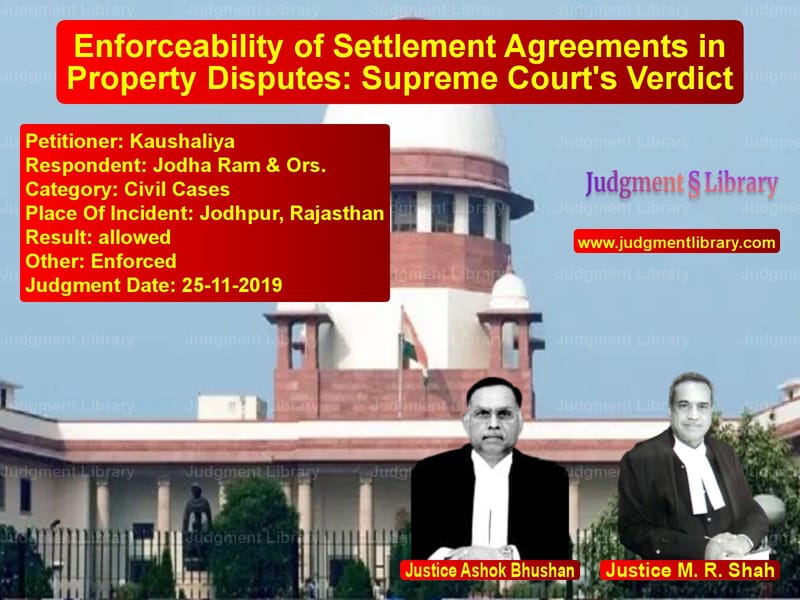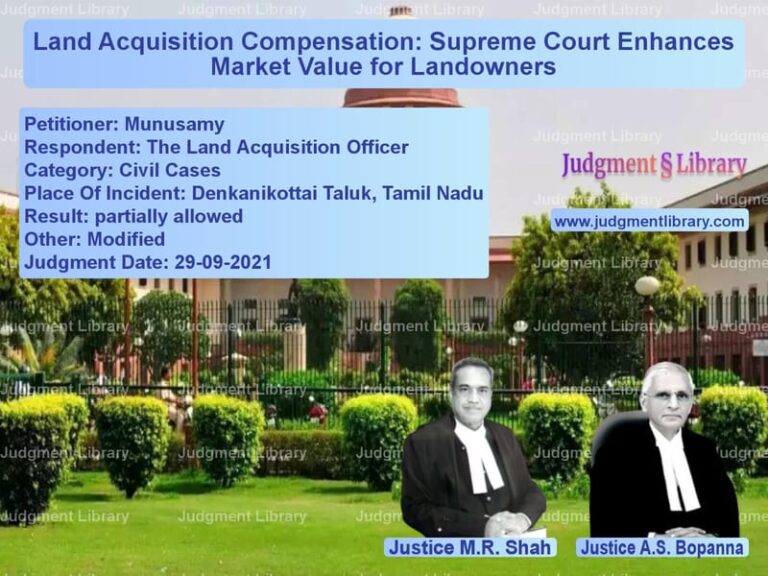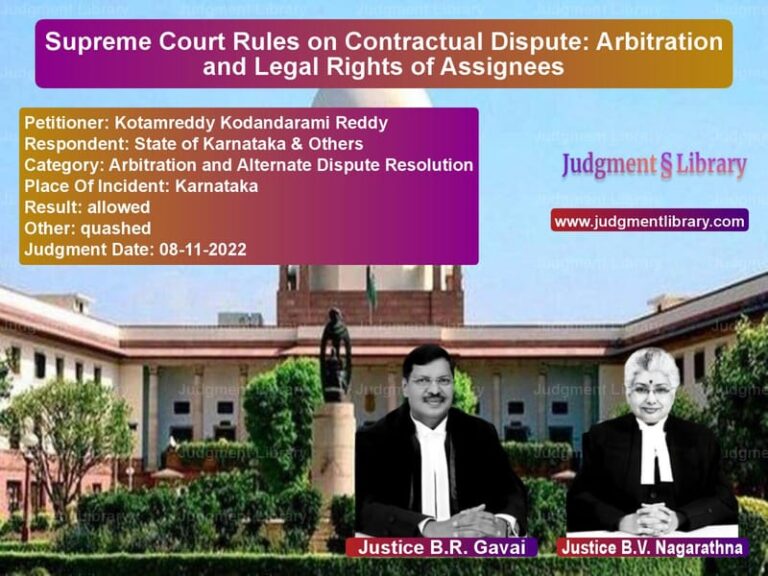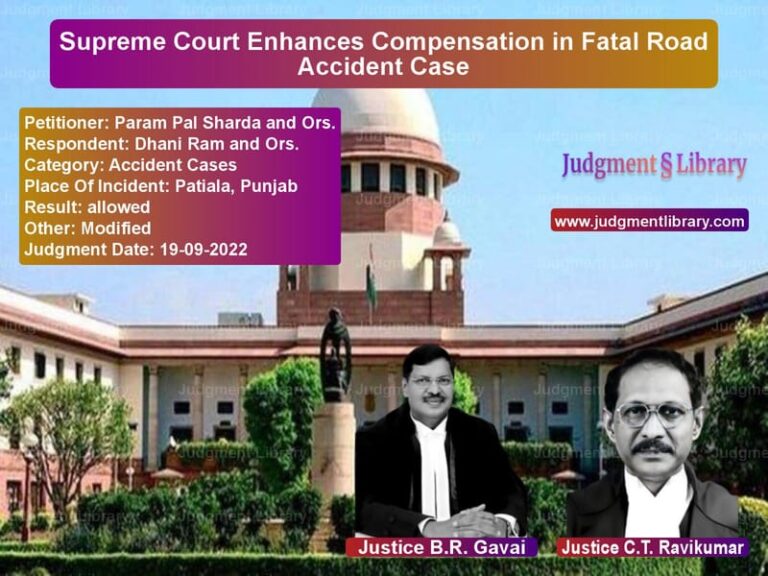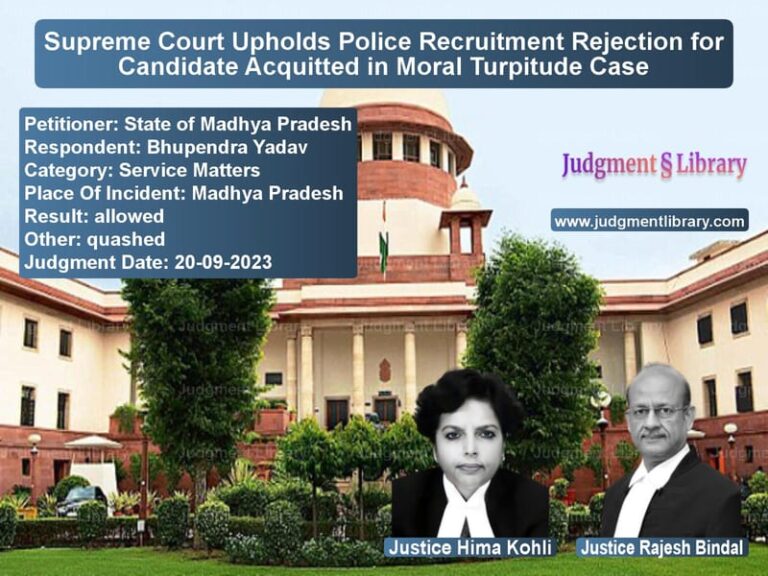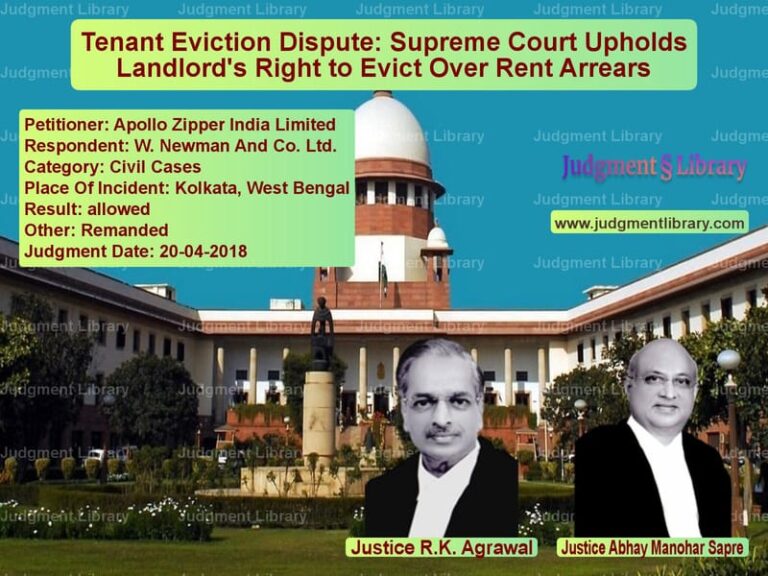Enforceability of Settlement Agreements in Property Disputes: Supreme Court’s Verdict
The Supreme Court of India, in the case of Kaushaliya v. Jodha Ram & Ors., examined the enforceability of a court-mediated settlement agreement in a long-standing property dispute between a father and daughter. The ruling emphasized the binding nature of settlement agreements recorded before the Supreme Court and the necessity of their strict compliance.
Background of the Case
The dispute arose between Kaushaliya (the petitioner) and her father, Jodha Ram (the respondent), over the ownership and possession of multiple properties in Jodhpur, Rajasthan. Kaushaliya had initially filed a suit seeking an injunction against her father regarding certain properties, while Jodha Ram filed a counterclaim. The trial court ruled in favor of Jodha Ram, dismissing Kaushaliya’s claim and allowing his counterclaim.
The case eventually reached the Supreme Court as Special Leave Petition (C) No. 10022 of 2016. During the proceedings, the Court referred the matter to the Supreme Court Mediation Centre to explore an amicable resolution.
Terms of the Settlement Agreement
On February 10, 2017, both parties signed a settlement agreement, which was subsequently recorded in a Supreme Court order dated May 5, 2017. The key terms included:
- Jodha Ram agreed to purchase a new property and register it in Kaushaliya’s name within four weeks of the final settlement order.
- All expenses related to the registration, stamp duty, and mutation of the new property were to be borne by Jodha Ram.
- In return, Kaushaliya agreed to hand over complete, vacant, and peaceful possession of disputed properties to Jodha Ram.
- All pending litigations between the parties were to be withdrawn within four weeks of the settlement order.
- Both parties undertook not to create third-party rights over the disputed properties.
Allegations of Non-Compliance
Despite the settlement, disputes arose regarding compliance:
- Kaushaliya claimed she had vacated the properties as per the agreement but had not received possession of the new property promised by Jodha Ram.
- Jodha Ram contended that Kaushaliya had failed to vacate all disputed properties, particularly Plot Nos. 29 and 29A of Jodha Bhawan, and therefore, he had withheld the transfer of the agreed-upon property.
- Third parties, Ramu Ram Vishnoi and Rampal Bishnoi, claimed they were in possession of Plot Nos. 29 and 29A based on an agreement to sell dated December 6, 2016, and challenged the settlement agreement’s validity concerning these plots.
Arguments by the Petitioner (Kaushaliya)
Kaushaliya, represented by Senior Advocate Ms. Bhati, argued:
- She had already fulfilled her commitment under the settlement agreement by vacating her share of the property.
- Jodha Ram was in contempt of the Supreme Court’s order by failing to transfer ownership of the new property as agreed.
- The objections raised by third parties (Ramu Ram and Rampal Bishnoi) were an attempt to derail the settlement and had no legal standing.
Arguments by the Respondent (Jodha Ram)
Jodha Ram, represented by Senior Advocate Mr. Sharma, countered:
- Kaushaliya had not fully vacated all disputed properties, specifically Plot Nos. 29 and 29A, and hence, he was justified in withholding the transfer of the new property.
- The claims by third parties regarding possession of the plots were fabricated to frustrate the execution of the settlement agreement.
- The execution proceedings in the trial court had already rejected the objections raised by third parties.
Supreme Court’s Observations and Ruling
1. Settlement Agreements Must Be Enforced
The Court reaffirmed that settlement agreements reached through mediation and recorded in Supreme Court orders are legally binding and must be complied with:
“Once a settlement agreement is recorded in a Supreme Court order, it is final and binding. The parties must strictly adhere to the agreed terms.”
2. Third Parties Have No Valid Claim
The Court dismissed the objections raised by third parties, holding that an agreement to sell does not confer ownership rights. Since Ramu Ram and Rampal Bishnoi had not obtained legal ownership of the disputed plots, their claims could not prevent the enforcement of the settlement agreement.
3. Execution Proceedings to Be Expedited
The Court directed the execution court to ensure full compliance with its previous orders:
“The Executing Court shall ensure that all disputed properties, including Plot Nos. 29 and 29A, are vacated and handed over to Jodha Ram within four weeks.”
4. Contempt Proceedings Against Non-Compliance
Recognizing that the settlement had not been honored in full, the Court warned that failure to comply with its directions would result in contempt proceedings.
Final Judgment
The Supreme Court dismissed the third-party claims and upheld the settlement agreement. It directed:
- Kaushaliya must vacate all remaining disputed properties.
- Jodha Ram must transfer the new property to Kaushaliya.
- The executing court must ensure the settlement agreement is fully implemented within four weeks.
Conclusion
This judgment reinforces the Supreme Court’s commitment to ensuring that mediated settlement agreements are upheld. The ruling clarifies that once a settlement is recorded in a court order, it must be executed in its entirety, and objections from third parties with no legal ownership will not be entertained.
For litigants, this case underscores the importance of adhering to settlement agreements and the potential for contempt proceedings if compliance is not met. It also serves as a precedent in property disputes, emphasizing that agreements to sell do not confer ownership rights unless followed by a legally executed sale deed.
Petitioner Name: Kaushaliya.Respondent Name: Jodha Ram & Ors..Judgment By: Justice Ashok Bhushan, Justice M. R. Shah.Place Of Incident: Jodhpur, Rajasthan.Judgment Date: 25-11-2019.
Don’t miss out on the full details! Download the complete judgment in PDF format below and gain valuable insights instantly!
Download Judgment: Kaushaliya vs Jodha Ram & Ors. Supreme Court of India Judgment Dated 25-11-2019.pdf
Direct Downlaod Judgment: Direct downlaod this Judgment
See all petitions in Property Disputes
See all petitions in Landlord-Tenant Disputes
See all petitions in Succession and Wills
See all petitions in Specific Performance
See all petitions in Contract Disputes
See all petitions in Judgment by Ashok Bhushan
See all petitions in Judgment by Mukeshkumar Rasikbhai Shah
See all petitions in allowed
See all petitions in Enforced
See all petitions in supreme court of India judgments November 2019
See all petitions in 2019 judgments
See all posts in Civil Cases Category
See all allowed petitions in Civil Cases Category
See all Dismissed petitions in Civil Cases Category
See all partially allowed petitions in Civil Cases Category

